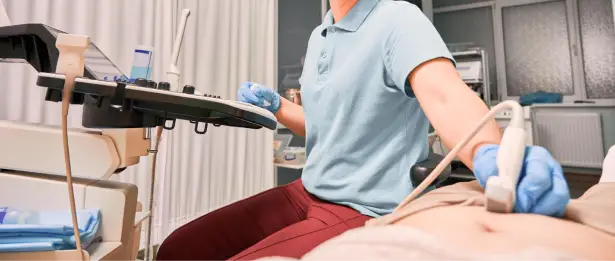IVF (In Vitro Fertilization)

Last Update Date: 9/3/2024 11:31:38 AM
What is In Vitro Fertilization (IVF)
In Vitro Fertilization (IVF) clinic is a special clinic that serves couples who have difficulty conceiving through natural means and resort to assisted reproductive techniques. In these clinics, specialist physicians, embryologists and other medical personnel work together. IVF clinics are facilities that focus on reproductive technologies and treatments. IVF clinics offer various assisted reproductive treatments to couples in order to increase their chances of pregnancy.
What Procedures Does an In Vitro Fertilization (IVF) Clinic Perform
IVF clinics aim to increase the chances of pregnancy of couples by offering various reproductive technologies and treatments. Here are the main procedures performed by IVF clinics:
Fertility Assessment: The reproductive health of couples is evaluated. The reproductive potential of couples is assessed by methods such as hormonal tests, ultrasound examinations and sperm analysis.
Ovarian Stimulation (Egg Development): The woman's ovaries are stimulated to develop more eggs by using hormonal medications. This constitutes the beginning of IVF treatment.
Egg Collection (Oocyte Aspiration): Matured eggs are collected from the woman's ovaries through a surgical procedure. Sperm Provision and Preparation: The sperm sample taken from the man is made suitable for laboratory conditions for the fertilization process.
Fertilization: Eggs and sperm are brought together in a laboratory environment and the fertilization process is performed. Successfully fertilized egg and sperm union merge into an embryo.
Embryo Development and Selection: Embryos obtained from successfully fertilized eggs are developed in a laboratory environment for several days and the healthiest ones are selected.
Transfer to the Uterus: The healthy embryos that are chosen are transferred to the woman's uterus. This is a critical step for the pregnancy to begin. Pregnancy Follow-up and Support: After the transfer to the uterus, the clinic follows up the pregnancy process and provides support to couples in case pregnancy begins.
Liv Hospital In Vitro Fertilization (IVF) Clinic
The path to parenthood can sometimes be difficult and long. Our Team at Liv Hospital IVF Center is turning the dreams of couples on this challenging journey into reality with a high success rate.
Compliant with international criteria
Liv Hospital offers the most advanced treatment options to couples in the field of reproductive health as well as in all medical processes. Guests are served with unlimited support, extensive clinical experience and the latest treatment protocols through the quality standards established in line with international criteria.
Psychological support is also provided
Liv Hospital IVF Center, consisting of physicians who are specialists in their fields and aiming for personalized treatment, decides the most appropriate treatment option together with its guests. Following the first meeting, ovulation induction (regulating ovulation with medications), surgical intervention, intrauterine insemination or IVF-ICSI (in vitro fertilization – microinjection) treatments are provided depending on the cause of infertility. Psychological support is also provided.
What is infertility?
Outcome not resulting in pregnancy at the end of one year despite unprotected and sufficiently frequent intercourse is called infertility. 85% of couples achieve pregnancy within one year, 93% within two years. The remaining group is considered infertile and they need assisted reproductive techniques. Infertility problem can be observed in 15-20% of the society.
Causes of Infertility
With today's technology, factors that prevent pregnancy can be detected in 85-90% of infertile couples. About 40% of these are female sourced, while 40% are male sourced. In the remaining group of 20%, all parameters are normal which means that, with our current knowledge, no tangible cause is found in the couples in this group. This condition is called “unexplained infertility”.
Women's age and egg reserve are important
The most important factor affecting the success of IVF treatments is the woman's age and the woman's egg reserve. Especially in women over the age of 38, the number and quality of eggs in reserve begin to seriously decrease, and pregnancy rates even with in vitro fertilization for those over the age of 40 drop to 30 percent. According to currently accepted criteria, 45 years of age is considered the maximum age for women to achieve pregnancy with treatments (with some exceptions).While some female sourced problems may require surgical operation before in vitro fertilization treatment, some problems may change the treatment protocol to be performed. For example, congenital or acquired disorders in the uterus are first surgically corrected and then treatment is started, or in cases where the woman's ovarian reserve is less or more than expected depending on her age, treatment protocols and drug doses are adjusted accordingly.
Female sourced causes
- Closed tubes, hydrosalpinx (Inflammation of the tubes)Ovulation disorders, polycystic ovary syndrome
- Uterine and cervical disorders, congenital curtain in the uterus
- Hormonal and metabolic problems, thyroid dysfunction disorders
- Endometriosis and chocolate cysts
- Abdominal membrane problems, adhesions due to previous operations
- Advanced female age
- Vaginismus
Male sourced causes
In 30-40 percent of infertile couples, the sole cause is male. In 10-15%, it is accompanied by female sourced problems. Semen analysis is the most basic and guiding step of infertility tests.








